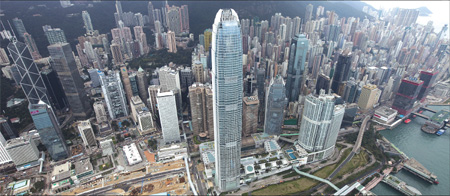New govt anti-bubble plan
Updated: 2010-02-25 07:34
By George Ng(HK Edition)
|
|||||||
|
The International Finance Centre stands in Central, the business district of Hong Kong. The city plans to raise the stamp duty, or transaction tax, on homes selling for more than HK$20 million ($2.57 million) to 4.25 percent from the current 3.75 percent to cool the property market, Financial Secretary John Tsang said yesterday in the Budget Speech. Bloomberg News |
Luxury flat stamp duty raised, land supply to be increased
HONG KONG: In a clear message to the property market, the government has acted to curb speculation in the residential market by raising transaction costs of luxury flats.
The stamp duty on luxury home transactions will be raised by half a percentage point as the government steps up its efforts, including increasing the land supply, to prevent a property bubble from forming, Financial Secretary John Tsang said yesterday.
Starting from April, the stamp duty on transactions of properties valued more than HK$20 million will be increased from 3.75 percent to 4.25 percent, and buyers will no longer be allowed to defer payment of the stamp duty on such transactions, the financial chief said.

"While the local property market is still reasonably healthy, we must not lose sight of the increasing risk of a property bubble developing," the financial chief said in his Budget Speech.
But market experts are skeptical about the effectiveness of the new measure.
"The increase in stamp duty won't have much impact on the luxury home market, as the added cost will be insignificant compared with the transaction prices," said Willy Liu, Managing director of Ricacorp Properties Ltd.
In end-January, luxury home prices returned to the peaks during the 1997 property boom, while overall property prices are eight percent above their peaks before the financial tsunami.
The increased risk of a property bubble, coupled with a relatively low supply of flats in the past two years, has aroused public concern about the difficulty of buying homes faced by ordinary citizens.
The government is taking a two-pronged approach - increasing supply and curbing speculative demand "to ensure a healthy and stable development of the property market", the financial chief said.
As a result of the government's recent efforts to increase land supply, the supply of flats in the coming few years will increase, he said.
Private residential units completed this year will likely increase to 14,300 units, while total flat supply in the private residential market in the coming three to four years is expected to come to about 53,000 units, he said.
"These supplies will be enough to meet housing demand and help prevent a bubble from forming," said Professor Francis Wong of the Department of Building and Real Estate at the Hong Kong Polytechnic University.
However, he cautions against reading too much into the estimated figures as the actual supply will be basically determined by the pace of developers' project launches. "Developers have their own paces in launching projects," he said.
Patrick Chow, research head of Ricacorp Properties Ltd, also believes the forecast supplies will be "basically enough" to meet the demand from end-users.
However, he was quick to point out the existence of the investment demand factor, a variable that always affects the balance.
In his Budget Speech, the Financial Secretary unveiled additional measures to further increase the supply of flats in the future.
The government will improve its land auction mechanism in order to increase residential land supply. One of the possible measures is to put up several urban residential sites in its application list for sale by auction or tender in the coming two years if they have not been triggered, he said.
Under the application list system, a site could be triggered for auction when the government receives an application with a "satisfactory" minimum bid price.
In another measure to boost supply, the government is preparing to sell by open tender a site of about 1.2 hectares near the West Rail Long Ping Station in Yuen Long for private residential purpose, the financial chief said.
In order to increase the supply of small and medium-sized flats, the government will specify the minimum number and the range of size of such units in the land sale conditions requirements for the Yuen Long site.
It will also ask the MTR Corporation and the Urban Renewal Authority to increase the supply of small and medium-sized residential flats in their West Rail property development projects and urban renewal projects, respectively, the financial chief said.
Meanwhile, the government will explore means to revitalize the secondary market for subsidized homes sold under its Home Ownership Scheme (HOS), which was suspended after the 1998 Asian financial crisis caused a slump in the local property market. "We are studying all potential options," a government spokesman told China Daily.
However, Polytechnic University's Prof Wong believes that the mere revitalization of the secondary market for HOS flats won't provide much help in meeting the housing demand of middle-income families.
"I was disappointed that the government did not unveil any plan to resume building new homes under this scheme," Polytechnic University's Prof Wong said, noting that many middle-income families can't afford to buy a home in the private residential market.
In another move to curb speculation, the Inland Revenue Department will step up its efforts to levy profits taxes on persons or companies who buy and sell properties for profits, the financial chief said.
Other measures to curb speculation include ensuring higher transparency in property transactions and transaction prices and preventing excessive expansion in mortgage lending, he said.
(HK Edition 02/25/2010 page3)
